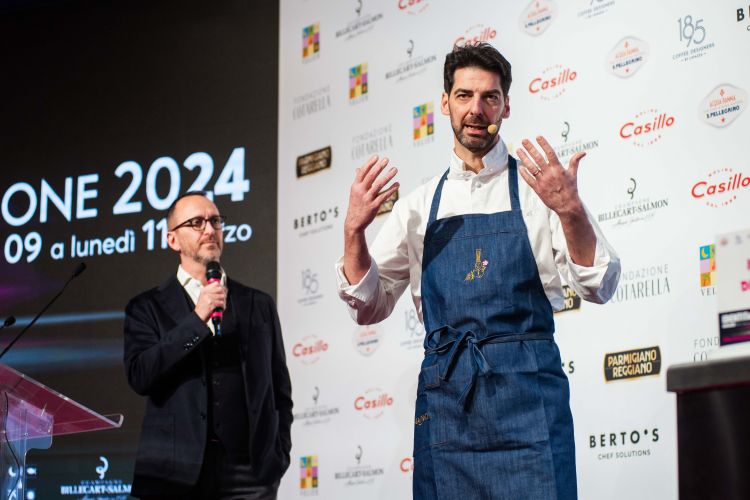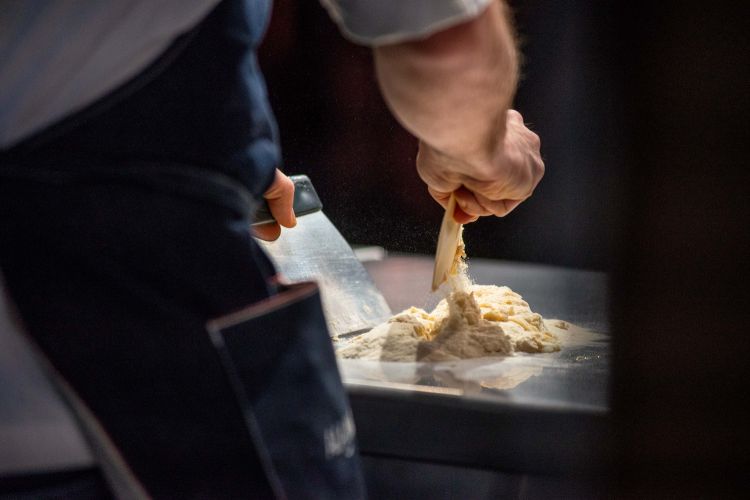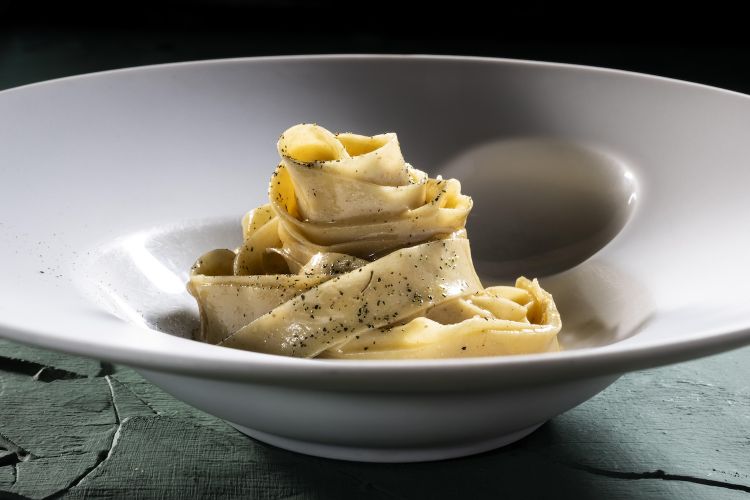Massimiliano's sense of hearing. Massimiliano Alajmo, the three-starred chef from Le Calandre in Rubano (Padua), gave an unusual and captivating talk. He charmed the audience of Identità Milano 2024 with an immersive journey into the way sound influences the gastronomic experience, contributing to a true cognitive investigation of oneself. Crack, bùm.
Alajmo starts with a dish, a simple dish, that his collaborators Michele and Luca prepare ('Two chefs who are much more talented than me,' he jokes) but we are not in the cooking show zone at all. No one in the room is ready for what is to follow. The dish is called Suono N'Uovo (I Play an Egg) and the name already hints at the ingredient around which everything will revolve. ‘I started from the idea of egg pasta. Leafing through recipe books we only come across recipes where the yolk and white are used, the whole egg you would say, and so I thought of using the whole egg for real. Then I remembered my grandmother, who used to serve me very thick honey in a certain yoghurt jar and serve it to me in the egg shell. The sound of that thing stayed with me. And I started from that sound.’ To arrive at the final result, Massimiliano and his collaborators pulverised the shell, after sterilising it, and added it to the dough.

Alajmo with Federico De Cesare Viola, who presented his lecture
But something was wrong. There is, after all, a
Spoon River of abandoned dishes, where action does not follow thought. ‘We tasted the dish and instinctively were about to discard it, this dusty sedimentation under the teeth had something unpleasant about it. Then...'. Then, the idea, which came to who knows who. ‘We plugged our ears and a totally different path began, a crazy journey, the experience sent you back to an idea of movement, of exploration, of inner investigation, and it opened up an incredible scenario for us.’
Suono N'Uovo are rather traditional fettuccine, apart from the shell powder of course, lightly smoked with dried herbs such as thyme, marjoram, sage and bay leaf, cooked in boiling water and seasoned with a fondue of castelmagno made with vegetable milk to enhance the cheese's fragrance and a highly concentrated double chicken broth thickened with a dash of potato starch.


The pasta is sautéed with parmesan cheese, castelmagno cheese and finished with dried herb powder. You eat a forkful and then drink a liquid made of hazelnut butter diluted with celeriac water. The result is a dish with elegant mountain aromas. Good, probably very good. But the fact is that the customer ordering it in the Rubano restaurant will be equipped with earplugs and will also be asked to close their eyes 'like shutters'. Alajmo swears: 'You immerse yourself in an almost hypnotic, very strong, tasting experience. I did some tests, if one manages to isolate oneself it is very pleasant, very regressive, even if everyone has a different sound box, my experience cannot be your experience.’ We are not in front of a stunt to
épater les bourgeois, but at the end, or rather at the centre, perhaps at the beginning, of a path that has seen the Paduan chef work for a long time on investigating the role of listening in the dining experience. 'Hearing,' Alajmo says showing the slides, 'is one of the most neglected senses, but what we hear when we eat and drink are more important sounds than we think. When you walk into a silent café, maybe the coffee is delicious, but you miss 'its sound'; if instead you hear a grinder in action, that sound gives you information that you take in and anticipate the taste experience'.

But sounds can be very different. There’s an external sound, transmitted by sound waves, and an internal sound, 'which occurs at the jaw level' and which conveys the satisfaction of chewing. Alajmo tells of tests he came across in the course of his research, that show how changing the sound of the bite changes the perception of crispness and freshness of a humble industrial crisp, how the brain integrates auditory sensations in an immediate and automatic way, altering our perception of the texture of the food in our mouth, how certain auditory stimuli anticipate the sense of our experience. The rest is vertigo. Amplifying the sounds of food intensifies our inner perception, transforming the act of eating into a journey within the journey, to discover ourselves, our relationship with food, with its ancestral component, of birth and rebirth, as an instrument of awareness and knowledge, as if we were children again, moving from the maternal breast (‘The first restaurant of our life’) to the discovery of chewing and its epistemological value. 'To listen to matter even for an instant is to become part of it,' Alajmo concludes. I chew, therefore I am. The rest is noise. In the background.

Translated into English by Slawka G. Scarso